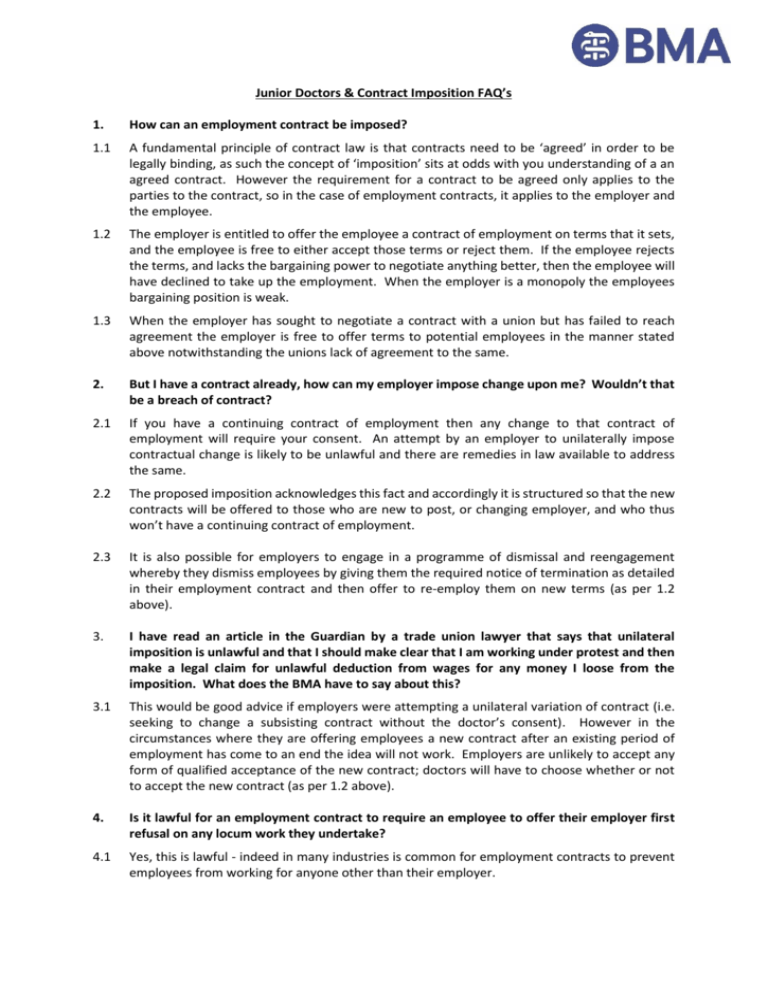Junior Doctors & Contract Imposition FAQ's 1. How can an
advertisement

Junior Doctors & Contract Imposition FAQ’s 1. How can an employment contract be imposed? 1.1 A fundamental principle of contract law is that contracts need to be ‘agreed’ in order to be legally binding, as such the concept of ‘imposition’ sits at odds with you understanding of a an agreed contract. However the requirement for a contract to be agreed only applies to the parties to the contract, so in the case of employment contracts, it applies to the employer and the employee. 1.2 The employer is entitled to offer the employee a contract of employment on terms that it sets, and the employee is free to either accept those terms or reject them. If the employee rejects the terms, and lacks the bargaining power to negotiate anything better, then the employee will have declined to take up the employment. When the employer is a monopoly the employees bargaining position is weak. 1.3 When the employer has sought to negotiate a contract with a union but has failed to reach agreement the employer is free to offer terms to potential employees in the manner stated above notwithstanding the unions lack of agreement to the same. 2. But I have a contract already, how can my employer impose change upon me? Wouldn’t that be a breach of contract? 2.1 If you have a continuing contract of employment then any change to that contract of employment will require your consent. An attempt by an employer to unilaterally impose contractual change is likely to be unlawful and there are remedies in law available to address the same. 2.2 The proposed imposition acknowledges this fact and accordingly it is structured so that the new contracts will be offered to those who are new to post, or changing employer, and who thus won’t have a continuing contract of employment. 2.3 It is also possible for employers to engage in a programme of dismissal and reengagement whereby they dismiss employees by giving them the required notice of termination as detailed in their employment contract and then offer to re-employ them on new terms (as per 1.2 above). 3. I have read an article in the Guardian by a trade union lawyer that says that unilateral imposition is unlawful and that I should make clear that I am working under protest and then make a legal claim for unlawful deduction from wages for any money I loose from the imposition. What does the BMA have to say about this? 3.1 This would be good advice if employers were attempting a unilateral variation of contract (i.e. seeking to change a subsisting contract without the doctor’s consent). However in the circumstances where they are offering employees a new contract after an existing period of employment has come to an end the idea will not work. Employers are unlikely to accept any form of qualified acceptance of the new contract; doctors will have to choose whether or not to accept the new contract (as per 1.2 above). 4. Is it lawful for an employment contract to require an employee to offer their employer first refusal on any locum work they undertake? 4.1 Yes, this is lawful - indeed in many industries is common for employment contracts to prevent employees from working for anyone other than their employer. 5. The propose contract is only going to offer premium time who to doctors who work more than 1 in 4 Saturdays, is this discriminatory towards part-time workers who are more likely to be female? 5.1 It depends how this is going to be implemented. We think there is a good argument that, in order to avoid discriminating against part-time workers the principle would need to be applied in a pro-rata manner – so for instance that a doctor who worked 0.5 FTE would be paid premium time if they worked more than 1 in 8 Saturdays. 6 Has the BMA considered whether there are any discrimination issues in the proposed contract? 6.1 Yes we believe there are a number of features of the new contract that could, potentially, be deemed to constitute indirect discrimination towards one or more protected group. Public authorities such as NHS employers are required to have due regard to equalities issues before making decisions that impact upon the same. It is open to a public authority to conclude that indirect discrimination in question is a proportionate means of achieving a legitimate aim and, if it does so, of allowing the same to occur. 6.2 The BMA are actively monitoring equalities issues and considering what steps to take in light of the same. 7. Does the proposed contract infringe my human rights? 7.1 The BMA have considered human rights and concluded that there are no such issues in the proposed contract. 8. I understand that I will lose protection from unfair dismissal if I continue to take industrial action after 12 weeks from the start of the industrial action. Is this true and should it worry me? 8.1 After 12 weeks of taking ‘protected industrial action’ a dismissal by your employer on the basis that you are continuing to take industrial action will no longer be automatically unfair. An employer wishing to dismiss you will however have to dismissal all those employees who are continuing to take industrial action with you they cannot cherry pick who to dismiss and who not to. 8.2 You can expect that, once the 12 week period has expired, employers may send you a letter informing you that your protection from unfair dismissal has gone and that they will consider dismissing any employees who continue to take industrial action. This is a standard tactic to intimidate employees. 8.3 Doctors will need to consider how much risk they personally are at from dismissal which may largely be influenced by how many of their colleagues are continuing to take industrial action. A doctor who is accompanied on strike by a large number of colleagues may feel relatively safe; on who is striking alone or with a small number of colleagues may prove to be a much softer target. GP Trainees who are employed by their practice are one example of doctor who may be particularly vulnerable to dismissal. 8.4 The BMA could hold a fresh ballot for industrial action, this would result a new mandate and the 12 week period of protection would commence again on the first day of action; however there is the risk that the mandate may be less overwhelming that the 98 percent support we currently enjoy for strike action and the 99.4% support we enjoy for action short of a strike. 9. Would a mass resignation be lawful? Could we encourage new doctors not to accept the contract on offer? 9.1 Yes, a mass resignation would be lawful provided doctors give the required period of notice stipulated in their contract of employment. 9.2 Yes the BMA could lawfully recommend that doctors do not accept the new contract. Gareth Williams Senior Solicitor British Medical Association 18 February 2016






